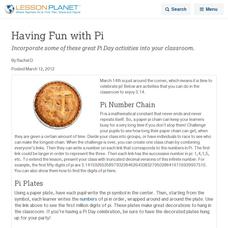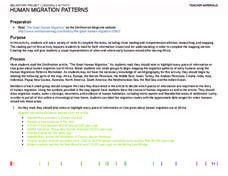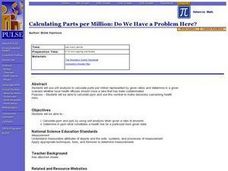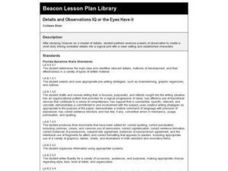Curated OER
Adding to the Picture: The 1963 March on Washington
Who do your scholars imagine when they think about the civil rights movement? If only a few faces come to mind, this lesson will expand their concepts of the movement's leaders. Learners examine an image of the 1963 March on Washington,...
Curated OER
Using Present Perfect Continuous
In this present perfect continuous verbs worksheet, students fill in the blanks in 20 sentences with 1 of the verbs ending in -ing listed in the word bank. Students also write their own sentences using have or has and present continuous...
Curated OER
What Famous Landmarks Have You Visited?
Responding to blog posts can increase written communication skills, critical thinking skills, and the use of social media as a means for discussion. Kids will compose a blog post in response to the provided article related to famous...
Curated OER
Student Opinion: What Small Things Have You Seen and Taken Note of Today?
An interesting and unusual topic for a news article, this resource from the New York Times website asks learners to take a moment and consider all the things they notice during a typical day. Based of the editorial piece "Things I...
Curated OER
Having Fun with Pi
Incorporate some of these great activities for Pi Day in your classroom
Big History Project
Human Migration Patterns
Humans have been on the move for millennia. Using an article from The Smithsonian, pupils chart human movement before written history on a world map. In addition, they examine the modes of transportation used by different waves of human...
Curated OER
Calculating Parts per Million: Do We Have a Problem Here?
Students calculate ppm and ppb by using unit analysis when given a ratio of amounts.
They determine in ppm what constitutes a health risk for a particular toxin given data
and whether local health officials should close a lake...
Curated OER
"Water Has Many Uses" Mini-unit
Students understand the importance of water as a resource in our lives. In this water mini-unit students recognize that not all countries have water available as we do. Students discuss and explain a plan for responsibilities of getting...
Curated OER
Details and Observations IQ or the Eyes Have it
Fourth graders study Chaucer as a master of details. Then, they create a short story linking unrelated details into a logical plot with a clear setting and established characters. This lesson plan has some excellent worksheets attached!
Curated OER
Do You Have a Sinking Feeling
Students determine how marine archaeologists use historical and archaeological data to draw inferences about shipwrecks. Students plot the position of a shipwrecked vessel, and draw inferences about the shipwreck from artifacts that have...
Curated OER
Have a Ball with Bernoulli
Third graders investigate Bernoulli's Principle. In this Bernoulli's Principle lesson, 3rd graders examine blowing air through a tube and the movement of the ball. Students make inquiries into what effect the air has on the ball and...
Curated OER
Why Koala Has A Stumpy Tail
Students examine Australian folktales. In this folktales lesson, students read the Australian folktale, Why Koala Has a Stumpy Tale. Students list characteristics of the characters from the book. Students act out these characteristics...
Curated OER
Have you seen the man on the moon?
Students study about the phases of the moon and create a picture of the night sky. They use Super print or Kid Pix to create the picture. Students also decide if the picture they have chosen is good for seeing moon and stars or not.
Curated OER
From Ada to Grace to Sandy - Women Have IT
Explore the significant contributions women have made in the field of information technology with an instructive lesson plan. Through class discussion and research, young scholars discover how women have aided in the growth of the field...
Curated OER
Cartoons: How Have Society's Views of Women Changed Over Time?
Students explore women's rights by viewing cartoon images. In this women's history instructional activity, students view several images depicting women in a certain way while discussing the meaning of the imagery among their classmates....
Curated OER
You Have to Live in Somebody Else's Country to Understand
Students reflect on emotions commonly expressed by outsiders. They identify feelings of people who have just arrived in America. They read and analyze a poem about immigration.
Curated OER
Do You Have the Strength?
Students examine the strength and resilience of the human heart. They squeeze a tennis ball to demonstrate the strength of the human heart, record and analyze the results on a worksheet, and create a poster of a design of a device to...
Curated OER
Boggles World: Have You Seen Jack? An ESL Role-Play
Students participate in a role-play designed to teach intermediate English language students to relative clauses and appositives. They are divided into two groups. Students from group 1 ask students from group 2 if they have seen Jack...
Curated OER
Radical Has Real Values
In this algebra instructional activity, students find all the real numbers for a radical equation. They verify that radicals have real numbers. There is an answer key.
Teach Engineering
How a Hybrid Works
Work with your class to connect series and parallel circuits to hybrid cars. The instructional activity introduces basic circuit diagrams before having scholars apply the understanding of the difference between parallel and...
Curated OER
Grammar Test: Have
In this grammar test worksheet, 2nd graders write questions using the pictures and the red hat. Students write the 8 questions using the verb have or has.
Curated OER
ESL Grammar: Have To
In these English Learners grammar worksheets, students complete five worksheets with various activities that help them learn how to correctly use the phrases 'I have to' and 'I don't have to.'
Scholastic
Study Jams! Severe Storms
Tornadoes and hurricanes and blizzards, oh my! Severe storms are always occurring somewhere on the planet. By reading through these slides, learners discover the characteristics of each type. Have them do this as homework and then take...
Captain Planet Foundation
Fall into Healthy Shapes
Kindergartners identify geometric shapes by planting a fall garden. They start their seeds in containers that have different shapes, and keep track of their plants based on those shapes. This brilliantly designed and incredibly thorough...
Other popular searches
- 1st Grade Grammar Has/have
- Helping Verbs Have Has
- Has and Have
- I Have Who Has
- I Have Who Has Game
- Using Has and Have
- Has Have
- Have To/has To
- Verbs Has and Have
- Have Got Has Got
- Have Has Had
- Language Has and Have























